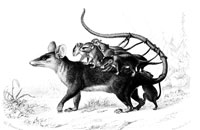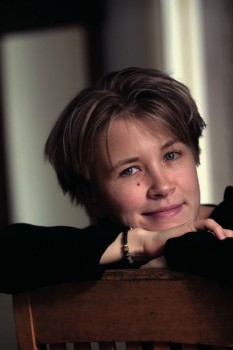Search results for "ilpo tiihonen/feed/rss2/Ilpo Tiihonen"
Dinner with Marie
30 June 2008 | Archives online, Fiction, Prose
Extracts from the novel Marie (WSOY, 2008). Introduction by Tuomas Juntunen
For once, Marie decided to plan a dinner without the same old roast beef, boiled potatoes, peas, red wine and berry kissel. And particularly no game. The thought of rabbit reminded her of the hunting trip to Porpakka, the hounds puking up rabbit skins onto the parquet floor, the smell of singed birds, the feathers that turned up even weeks later in a corner of the kitchen, the buckshot in the goose that broke her tooth. Mind you, she had to admit that brown sauce was quite good, especially as an aspic. She had tasted a spoonful once the morning after it was made, when Martta had gone out to buy milk and Marja was cleaning the drawing room, and then Martta had come back quite suddenly, and Marie had panicked and swallowed it the wrong way and had a fit of coughing. ‘Good heavens,’ Martta had said, ‘what’s the matter? I just came back to get my purse. I forgot it on the sideboard.’
The true reason for the plan was that she wanted to show them what a real French formal dinner was like, how much better it was. She planned the menu secretly for months, first in her mind, then in writing, at her bedroom dressing table – the only place she had to herself, although the door wouldn’t lock – at first on wrapping paper, which she later burnt in the tiled stove in the dining room when no one was home. More…
The Schoolmaster’s bicycle trip
30 June 2005 | Archives online, Fiction, Prose
A short story from the collection Heta Rahko korkeassa iässä (‘Heta Rahko at a great age’, Otava, 1947). Introduction by Vesa Karonen
He was an old teacher, retired, mostly known as ‘the Schoolmaster’ in this small town. It was common knowledge that he’d always been a keen gymnast and sportsman, and after retirement he began pursuing his favourite pastimes in earnest. Evidently he revelled in moving about, like a baby on the crawl, or a feisty youth. He was a man with no personal ties, with no one to patronise or distract him.
‘You grow no wiser, even with age,’ the small-town folk kept sighing. In response to one of these groans, Porki the factory owner said what they thought was almost blasphemy:
‘When did old age ever produce any wisdom? It’s always demolished any little there was….’
And meanwhile, covertly envious, he watched the youthful-looking Schoolmaster striding along his path, lean, sinewy, stern-faced, his tuft of beard only reluctantly thinning and greying. Well, there was a person who’d realised life was motion – and believed it! But Porki and the other bigwigs in the town grew bloated and obese, huffed and puffed, and yawned. More…
That remarkable man
31 December 1988 | Archives online, Fiction, poetry
Poems by Lauri Viita. Introduction by Kai Laitinen
Alfhild
Mothers alone, endowed
with hope, see God.
They’re given strength and given will,
to climb in dream from under the cloud,
and look from a higher hill.
Alfhild, she who gave me birth,
nightly sailed away from earth
to where her Eemeli growled his say,
coming and going, as he did in his day.
Now they walk
the bright star track,
father and mother, looking back
at the little hill and the family home,
the cats, the dogs, the people they’ve known,
waving and calling as best they can
lest any of us trip on Pispala’s stone.
On a distant planet on a garden swing
under a rowan they linger and cling
and silently remember their light and dark
as a courting couple in Tampere Park –
and if it was payday, the extra fun
of tucking away a coffee and bun. More…
Face to face
24 June 2010 | This 'n' that
 You can now keep up with what’s new at Books from Finland on Facebook.
You can now keep up with what’s new at Books from Finland on Facebook.
And remember: you can also get Books from Finland articles delivered straight to your inbox or smartphone by signing up to our RSS feed, or subscribing to our regular newsletter – the new one is, as we used to say, currently in the typewriter and will be with you soon.
Let’s keep in touch!
Green gold, black gold
31 March 2001 | Archives online, Fiction, poetry
Poems from Jakutian aurinko (‘The Yakutian sun’; Tammi, 2000). Introduction by Kari Sallamaa
So this, then, is Tomsk,
a town, tumbling into snow.
Even its lanes rise up into the sky.
No longer fragrant the pine,
the juniper, not even the gardens.
Can’t trust the skirts,
above the rooftops,
stripes are beaten out of the carpet,
yellow and turquoise for the horizon,
under the rooftops, fingernails
rip the wallpaper,
those white frost fingernails.
So, this is Tomsk,
in its streets the Volgas zip by.
And when I get a ride, the back seat fills up in no time.
Breath steams, nylon rips. The ladies
apply lipstick, unconcerned. More…
Practically public
31 December 2002 | Archives online, Fiction, poetry
Poems from Koko tarina (‘The whole story’, Tammi, 2002). Introduction by Anselm Hollo
Pan shot
A whitewashed wall, small windows
advent calendar peepholes at the end of darkness,
lit-up squares
One two three kitchens awake at 7
each tenant bends over a kettle of porridge
in the gurgling coffeemaker’s soundscape,
opens the refrigerator
see the hunter in action: let’s spear this yoghurt
and the building across the way testifies to all of this
practically public activity
the evening’s closure of curtains, turnings-off of the light,
nocturnal breastfeedings. Talking windows. A light comes on at: 2:54 AM
– what’s up now?
Is someone thinking about a bird she encountered at the cemetery? More…
Too beautiful
2 July 2009 | Extracts, Non-fiction

Illustration: The Universal Dictionary of Natural History (Paris, 1849)
Extracts from the collection of essays Kutistuva turska ja muita evoluution ihmeitä (‘The shrinking cod and other evolutionary marvels’) by Hanna Kokko & Katja Bargum
Who cannot but stand in awe of the genius of various parasites’ nervous system manipulations or of how beautifully the orchid ensures its pollination? The astonishingly precise adaptations of organisms are the starting point for the idea of Intelligent Design. According to Intelligent Design, such adaptations are too perfect to be products of evolution – rather, they reveal the actions of an intelligent designer. It’s a fascinating idea, write Hanna Kokko and Katja Bargum – but is it science? More…
Hearth, home – and writing
30 December 2007 | Archives online, Extracts, Non-fiction
Extracts from Fredrika Runeberg’s Min pennas saga, (‘The story of my pen’, ca. 1869–1877). Introduction by Merete Mazzarella
The joy and happiness I experience at being able to see into [her husband] Runeberg’s soul, at living with him in his heart and his thoughts, belong far too firmly to the mysteries of my soul that I should wish to attempt to express them in words. But of the life that existed around us I should like to try and give an impression of sorts.
We moved to Borgå in 1837. I was unfamiliar with the town and knew only a little old lady, weak with age, and found myself very lonely indeed, accustomed as I was to living with relatives and a genial circle of friends. I did, however, still have my two eldest sons at home to keep me happy and occupied. More…
All in good time
17 April 2009 | Letter from the Editors
 So here it is, Books from Finland’s new website. From the decision to abandon print and go online it’s been a long and sometimes circuitous journey to get here – a journey that has been far longer in the imagining than in the making. More…
So here it is, Books from Finland’s new website. From the decision to abandon print and go online it’s been a long and sometimes circuitous journey to get here – a journey that has been far longer in the imagining than in the making. More…
Mother-loves
31 March 1994 | Archives online, Fiction, Prose
Extracts from the novel Ihon aika (‘The time of the skin’, WSOY, 1993). Introduction by Suvi Ahola
In the hospital they stare at us, enquiringly, as if we are abandoning her. They look in turn at our mother’s half-conscious, ulcerous body, at the nurse who, curling her lip, cuts mother’s knickers, housecoat and apron off her, at us, the exhausted ones, who are now only at the beginning of our real work. They fill in their forms and ask their official questions; they do not know how anguished and relieved we shall be in a moment when we may leave our mother to them, that ironically smiling, wounded woman who is still, with her last strength, attempting to kick the nurse who is pouring warm water on her bloody feet.
I gaze at mother’s battered body with something like greed; I feel the same kind of curiosity toward this shocking sight as when I was four and we were in the bathroom together. I was shy, I tried to spy on mother’s fleshy body, her luxuriantly curving skin, through the mirror, but I was always left with the feeling that I had seen too little, I had been able to understand only a small part of what my eyes had registered. More…
Star-Eye
31 March 1984 | Archives online, Children's books, Fiction
A story from Läsning för barn (‘Reading for children’,1884). Introduction by George C. Schoolfield
There was once a little child lying in a snowdrift. Why? Because it had been lost.
It was Christmas Eve. The old Lapp was driving his sledge through the desolate mountains, and the old Lapp woman was following him. The snow sparkled, the Northern Lights were dancing, and the stars were shining brightly in the sky. The old Lapp thought this was a splendid journey and turned round to look for his wife who was alone in her little Lapp sledge, for the reindeer could not pull more than one person at a time. The woman was holding her little child in her arms. It was wrapped in a thick, soft reindeer skin, but it was difficult for the woman to drive a sledge properly with a child in her arms.
When they had reached the top of the mountain and were just starting off downhill, they came across a pack of wolves. It was a big pack, about forty or fifty of them, such as you often see in winter in Lapland when they are on the look-out for a reindeer. Now these wolves had not managed to catch any reindeer; they were howling with hunger and straight away began to pursue the old Lapp and his wife. More…
Letter to the wind
30 September 2002 | Archives online, Fiction, Prose
A short story from Haapaperhonen (‘The butterfly’, Gummerus, 2002). Introduction by Kristina Carlson
When Father comes to visit me, he sometimes sings a hymn. I can’t ask him not to. But when he doesn’t, I wonder why not, whether there’s something up with him. I can’t ask him to sing, but something is missing, the same thing that there seems to be too much of when he sings. It’s too much, but I miss it when it’s not there. I wonder about it after Father’s gone; my thoughts curl into dreams and I sleep.
When I sleep I don’t know I’m here, in a strange place. I’m at home, sleeping at home, in my own bed. The window is the right size, not too big like it is here; here there isn’t really a window at all, half the wall is missing and instead there’s glass. Behind a glass wall it’s not safe, everything is taken through it, including me. But sleep takes me to safety; I’m at home there. I breathe it peacefully. In the cabin there are two breathings, mine and Turo’s, and in the bedroom Father’s breathing. They are in no hurry to drive time away; time can linger, sleep, the moment of night, and when sleep withdraws there is no hurry either; I can sit in peace on the window seat and gaze at the cloudy, moonlit yard. The apple tree is asleep; it’s the only one. The fieldfares ate the apples before we could pick them, but it did not bother me or Father. It was good to look at the flock of fieldfares making a meal of the apple tree. Then they went away. More…

